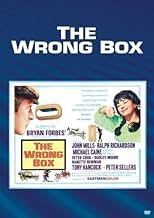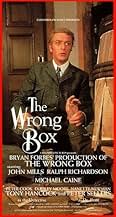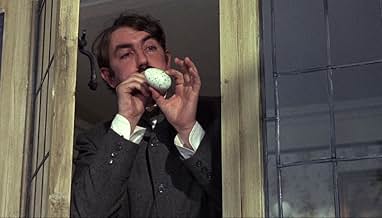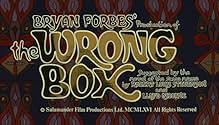VALUTAZIONE IMDb
6,7/10
4205
LA TUA VALUTAZIONE
Aggiungi una trama nella tua linguaIn Victorian England, a fortune now depends on which of two brothers outlives the other, or can be made to have seemed to do so.In Victorian England, a fortune now depends on which of two brothers outlives the other, or can be made to have seemed to do so.In Victorian England, a fortune now depends on which of two brothers outlives the other, or can be made to have seemed to do so.
- Regia
- Sceneggiatura
- Star
- Ha vinto 1 BAFTA Award
- 1 vittoria e 2 candidature totali
Recensioni in evidenza
Robert Louis Stevenson wrote novels that studied character and its flaws: Long John Silver in "Treasure Island", Aleck Breck Stewart in "Kidnapped" and "David Balfour", James and Henry Durie in "The Master Of Ballentrae", Dr. Henry Jeckyll/Mr. Edward Hyde.... His best novels show the ambiguity of character. Yet with his interest in melodramatics he should have been a natural for writing mystery and detective stories, like his contemporaries Conan Doyle, Gilbert Chesterton, and Ernest Brahmah. They concentrated their gifts on character developments on their central story figures (Holmes and Watson, Father Brown, Max Carrados), but the basic plot development is what pulls the story along for all of them. Stevenson pulled the story plot to develop the characters instead.
Except once - "The Wrong Box". It is Stevenson's spoof on mystery and detective fiction. It was not his novel alone, but the first of three he wrote with his stepson Lloyd Osborne (to whom he told the story of "Treasure Island" before he wrote it down). Stevenson is telling the story of Masterman and Joseph Finsbury, the last two survivors of a special type of insurance form called a "tontine". It's an elaborate wager where a bunch of people put up a sum of money individually, and the last survivor gets the bulk of it. Masterman is home bound, and Joseph is a lively old bore who loves to talk and show off his preposterous knowledge of trivia (Ralph Richardson brings out the fact about the word "whip" when riding with a man holding a "whip"). Masterman (John Mills) lives with his grandson Michael (Michael Caine), and Joseph with his two greedy nephews (Morris and John - Peter Cook and Dudley Moore) and his niece Julia (Nanette Newman). Joseph does not really care about the tontine, but Masterman wants it - and is willing to speed the demise of Joseph to do it. Morris and John have to keep Joseph alive (which is not unlikely - he is in good health). Michael is not quite sure what is going on with his irascible grandfather, and Julia just knows she dislikes her two cousins Morris and John (but she really likes Michael). So the stage is set for the comedy. Along the way we meet other characters who are colorful: Dr. Pratt (Peter Sellers) - who at the drop of a hat will tell you about how he fell from medical grace to the backstreet he resides in; Peacock (Wilfred Lawson), Masterman's butler, who makes the average turtle look like it's turbocharged; the police Detective (Tony Hancock) - who can't put together a coherent idea if his life depended on it; and ...the Bournmouth Strangler (the story is from 1888, so we can guess who this character is based on).
It is a marvelous send-up on Victorian England, taking in the empire (notice the beginning when we see the demises of various members of the tontine), to the problems of railway traffic, talkative relatives, and body disposal in London in the 1880s. That the novel is not quite like the film does not matter (Michael is not a medical student but a clever barrister in the story, and John's relationship with Morris deteriorates in the story due to some money troubles), but this does not matter. It is a fun movie and well worth seeing.
Except once - "The Wrong Box". It is Stevenson's spoof on mystery and detective fiction. It was not his novel alone, but the first of three he wrote with his stepson Lloyd Osborne (to whom he told the story of "Treasure Island" before he wrote it down). Stevenson is telling the story of Masterman and Joseph Finsbury, the last two survivors of a special type of insurance form called a "tontine". It's an elaborate wager where a bunch of people put up a sum of money individually, and the last survivor gets the bulk of it. Masterman is home bound, and Joseph is a lively old bore who loves to talk and show off his preposterous knowledge of trivia (Ralph Richardson brings out the fact about the word "whip" when riding with a man holding a "whip"). Masterman (John Mills) lives with his grandson Michael (Michael Caine), and Joseph with his two greedy nephews (Morris and John - Peter Cook and Dudley Moore) and his niece Julia (Nanette Newman). Joseph does not really care about the tontine, but Masterman wants it - and is willing to speed the demise of Joseph to do it. Morris and John have to keep Joseph alive (which is not unlikely - he is in good health). Michael is not quite sure what is going on with his irascible grandfather, and Julia just knows she dislikes her two cousins Morris and John (but she really likes Michael). So the stage is set for the comedy. Along the way we meet other characters who are colorful: Dr. Pratt (Peter Sellers) - who at the drop of a hat will tell you about how he fell from medical grace to the backstreet he resides in; Peacock (Wilfred Lawson), Masterman's butler, who makes the average turtle look like it's turbocharged; the police Detective (Tony Hancock) - who can't put together a coherent idea if his life depended on it; and ...the Bournmouth Strangler (the story is from 1888, so we can guess who this character is based on).
It is a marvelous send-up on Victorian England, taking in the empire (notice the beginning when we see the demises of various members of the tontine), to the problems of railway traffic, talkative relatives, and body disposal in London in the 1880s. That the novel is not quite like the film does not matter (Michael is not a medical student but a clever barrister in the story, and John's relationship with Morris deteriorates in the story due to some money troubles), but this does not matter. It is a fun movie and well worth seeing.
10drdcw
Little known in the United States, THE WRONG BOX is an absolute must-see for serious students of comedy. The plot revolves around a tontine, a lottery established by the well-heeled fathers of a class of English schoolboys, the proceeds to be awarded after many years to the last surviving member of the class. The story picks up at the point where only two of the classmates are still alive: the brothers Masterman and Joseph Finsbury, who rather detest one another. The plot is full of Finsburys, all of whom want one or the other to die first so they can get a piece of the loot.
Bryan Forbes's direction is first rate, visually exquisite, and even though the convoluted plot is a bit slow to get started, nicely paced. Forbes has a notable cast of experienced actors, and he gives them free reign to perform comedy as only the British can do. The climax chase comes to a head at exactly the right time and is hilarious, the more so because it is marvelously unforced. The actors involved give the impression they're delighted to be in the film, as they should be.
THE WRONG BOX is one of Michael Caine's earlier films and he performs creditably, and Peter Sellers shines in an excellent bit part. Nevertheless, my hat goes off to three other actors who give the performance of their careers: Ralph Richardson, as the quintessential pedant Joseph Finsbury, the world's most boring narcissist; Peter Cook, as Joseph's incessantly scheming nephew who wants to see his uncle die a few seconds after Masterman croaks; and most especially, Wilfrid Lawson as the wondrously torpid Peacock, Masterman's dignified but disheveled butler whose peculiar grunts and malapropisms remain fresh with every viewing of the film. I would put Lawson's performance on a par with Humphrey Bogart's in THE CAINE MUTINY or Fred MacMurray's in DOUBLE INDEMNITY -- it is truly that good.
THE WRONG BOX ranks on a par with THE LIFE OF BRIAN as one of the finest British comedies ever. Enjoy it!
Bryan Forbes's direction is first rate, visually exquisite, and even though the convoluted plot is a bit slow to get started, nicely paced. Forbes has a notable cast of experienced actors, and he gives them free reign to perform comedy as only the British can do. The climax chase comes to a head at exactly the right time and is hilarious, the more so because it is marvelously unforced. The actors involved give the impression they're delighted to be in the film, as they should be.
THE WRONG BOX is one of Michael Caine's earlier films and he performs creditably, and Peter Sellers shines in an excellent bit part. Nevertheless, my hat goes off to three other actors who give the performance of their careers: Ralph Richardson, as the quintessential pedant Joseph Finsbury, the world's most boring narcissist; Peter Cook, as Joseph's incessantly scheming nephew who wants to see his uncle die a few seconds after Masterman croaks; and most especially, Wilfrid Lawson as the wondrously torpid Peacock, Masterman's dignified but disheveled butler whose peculiar grunts and malapropisms remain fresh with every viewing of the film. I would put Lawson's performance on a par with Humphrey Bogart's in THE CAINE MUTINY or Fred MacMurray's in DOUBLE INDEMNITY -- it is truly that good.
THE WRONG BOX ranks on a par with THE LIFE OF BRIAN as one of the finest British comedies ever. Enjoy it!
10vox-sane
The quiet little black comedy "The Wrong Box" has a superb cast. Veteran British stage/cinema actors (Ralph Richardson, John Mills, Wilfred Lawson) play with rising stars (Michael Caine, just off "Alfie", and Peter Cook & Dudley Moore from the groundbreaking "Beyond the Fringe" revue). Established comic actors (Peter Sellers, Tony Hancock) give performances that carefully-polished little gems. Even the tiniest "blink and you'll miss 'em" roles are loaded with familiar character actors (Cicely Courtneidge, John Le Mesurier, Thorley Walters &c) rubbing elbows with rising talents (Jeremy Lloyd, James Villiers, Leonard Rossiter, Graham Stark) making the movie a veritable field day for spotters of British humor. The performances in the major roles are all solid. Some of the smaller parts have variable performances: Thorley Walters is delightful, Courtneidge, too overbearing). All the actors seem to realize that they must take this sort of comedy seriously -- mugging kills this sort of humor. The leads (Richardson, Mills, Cook, Moore, Caine, Lawson) are all suitably earnest. Only Nanette Newman (the director's wife) doesn't seem quite up to her part, being a better actress in modern dress; but she's quite pretty enough and she's good enough not to be utterly lost even in this ensemble of extremely talented actors.
The humor is quiet, with a Victorian hush over the proceedings, lending a (perhaps tongue in cheek) funereal respect to its theme of death with laughter. The gentle pace picks up near the end with a chase with hearses and beer wagons, and a climax that gathers all the principles in a cemetery in a satisfying conclusion.
The witty script is filled with little bits that might not register at first (such as the pulse bit, or "Can you speak a little lower" and the peculiar words "unnecessarily mutilated"). Some of the sight gags go askew, but enough of them work to make them worth while. It's not a movie for every taste. Anglophiles and those who appreciate an easy-going humor may find it work a peek. Anyone who loves Peter Sellers has to see his Pratt.
The humor is quiet, with a Victorian hush over the proceedings, lending a (perhaps tongue in cheek) funereal respect to its theme of death with laughter. The gentle pace picks up near the end with a chase with hearses and beer wagons, and a climax that gathers all the principles in a cemetery in a satisfying conclusion.
The witty script is filled with little bits that might not register at first (such as the pulse bit, or "Can you speak a little lower" and the peculiar words "unnecessarily mutilated"). Some of the sight gags go askew, but enough of them work to make them worth while. It's not a movie for every taste. Anglophiles and those who appreciate an easy-going humor may find it work a peek. Anyone who loves Peter Sellers has to see his Pratt.
10Signet
Without question, I would put THE WRONG BOX on any list of the ten best movies ever made. Certainly, to my mind, it is the most perfectly conceived and realized comedy to appear in my lifetime (and I have been around for a long spell). All the performances are flawless, but Peter Sellers's Dr. Pratt is, I believe, the best work he ever did on the screen. His characterization is hilariously funny and, at the same time, heart-wrenchingly poignant. It is worth the price of the film simply to see what he does with the kitten and the thermometer (No, not what you expect). I have always suspected that he and Peter Cook improvised their dialogue and these two brilliant satirists display a give-and-take of such high wit and subtlety that it is probably unique in cinema.
An amazing, wonderful, happy motion picture. THE WRONG BOX is a classic.
An amazing, wonderful, happy motion picture. THE WRONG BOX is a classic.
As one of the authors of the film, I'd like to say that neither of the Peters, Cook nor Sellers, did any ad libbing. As is usually the case with British actors, there was a great respect for, and reliance on, the written word.
Lo sapevi?
- QuizPeter Cook's wife, Wendy was nine months pregnant when filming began. Producer and director Bryan Forbes promised them that he would let Peter leave the set as soon as Wendy went into labor. He kept his word, and Peter made it to the hospital just in time for the birth of his daughter, Daisy. Forbes, Dudley Moore, Sir Michael Caine, and Peter Sellers filled his dressing room with flowers and champagne, in celebration of Daisy's birth, when he returned to work.
- BlooperThe Victorian-age London houses have TV antennae on them.
- Citazioni
[the doctor, owner of dozens of cats, is coughing]
Doctor Pratt: I'm all right; it's just a fur ball; it's nothing. Strangely, I haven't had fur for a fortnight.
- Curiosità sui crediti"Certain Funereal & Military Airs played by Her Majesty Queen Victoria's Temperance Seven (who actually number eight)"
- ConnessioniFeatured in Hollywood: The Gift of Laughter (1982)
- Colonne sonoreLight of Head
Written by Clifford Bevan
I più visti
Accedi per valutare e creare un elenco di titoli salvati per ottenere consigli personalizzati
- How long is The Wrong Box?Powered by Alexa
Dettagli
- Data di uscita
- Paese di origine
- Siti ufficiali
- Lingue
- Celebre anche come
- The Wrong Box
- Luoghi delle riprese
- Royal Crescent, Bath, Somerset, Inghilterra, Regno Unito(Finsbury residences)
- Azienda produttrice
- Vedi altri crediti dell’azienda su IMDbPro
Botteghino
- Lordo in tutto il mondo
- 15 USD
- Tempo di esecuzione1 ora 45 minuti
- Mix di suoni
- Proporzioni
- 1.66 : 1
Contribuisci a questa pagina
Suggerisci una modifica o aggiungi i contenuti mancanti

Divario superiore
By what name was La cassa sbagliata (1966) officially released in India in English?
Rispondi





































